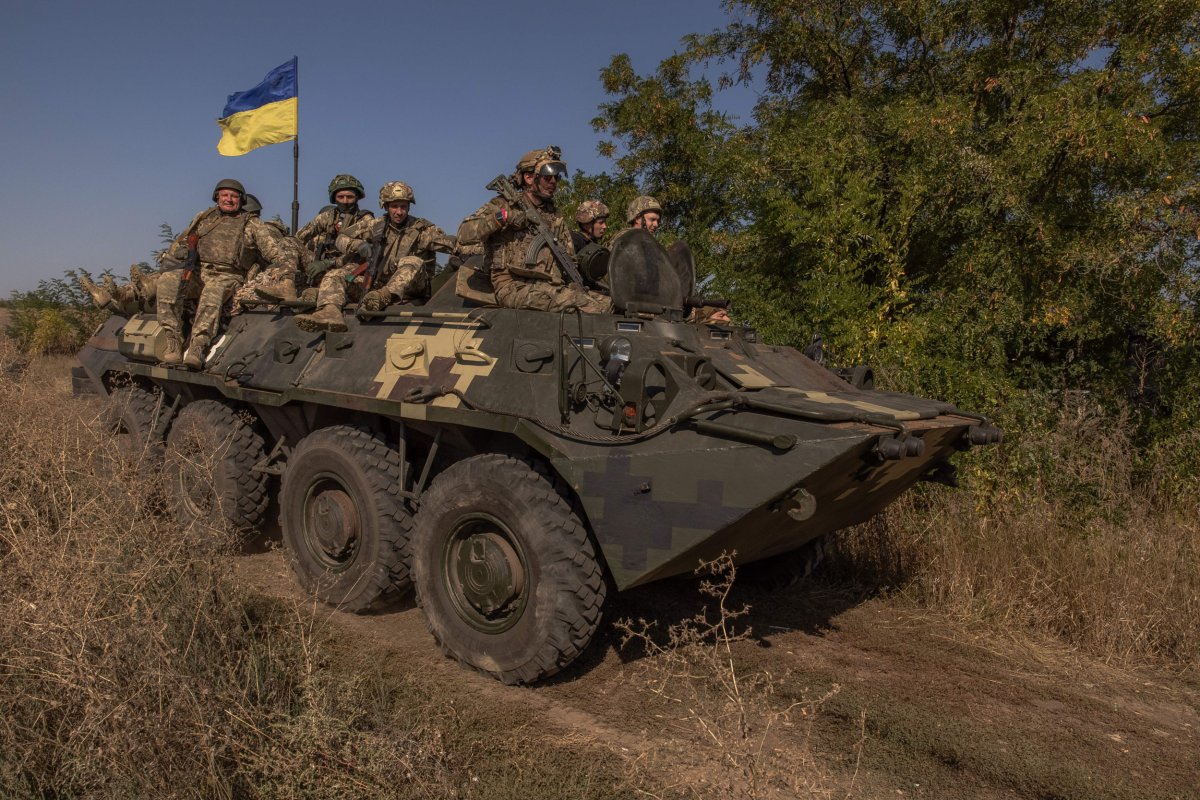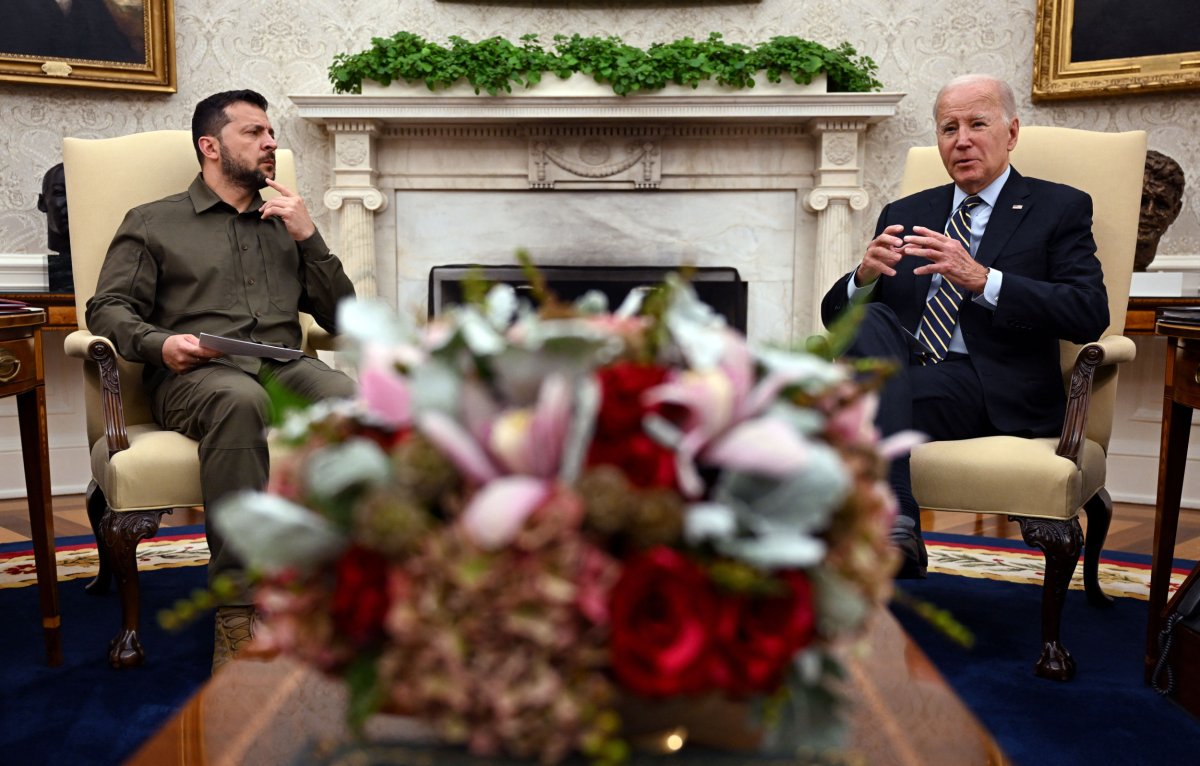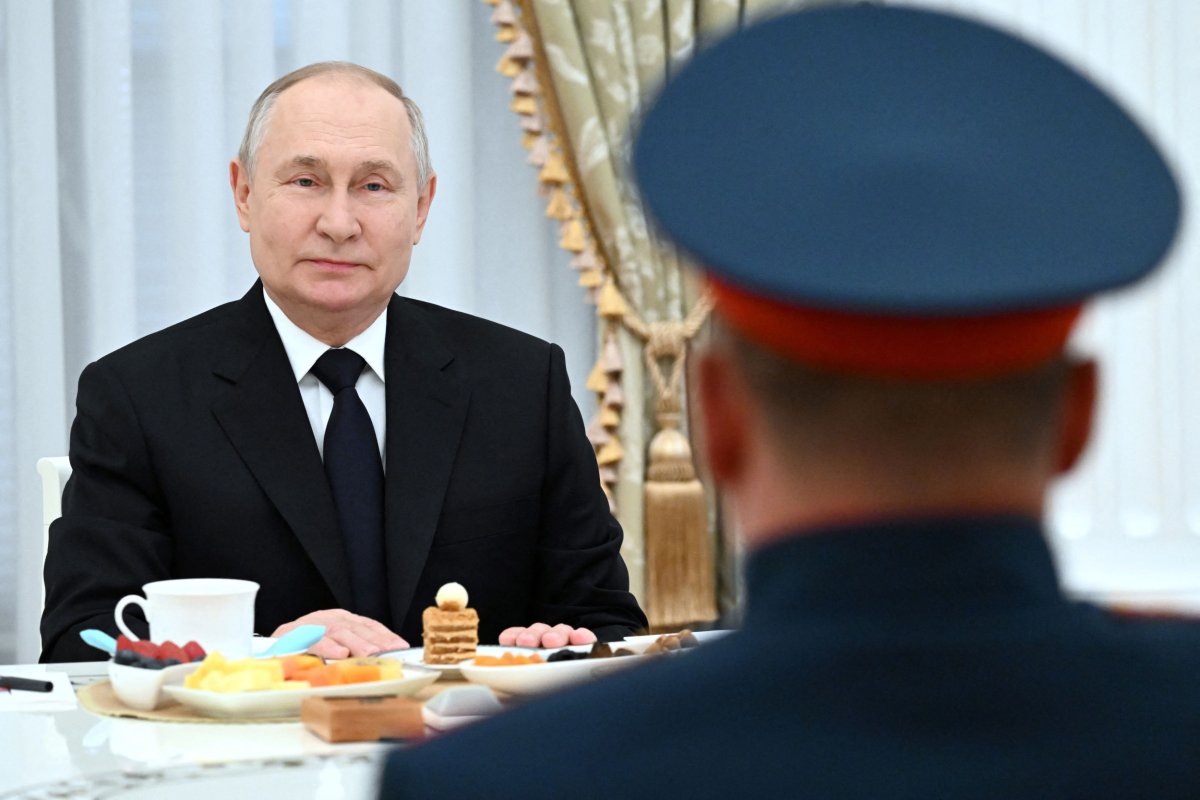As the political debate intensifies over the future of U.S. military assistance to Ukraine in the midst of its efforts to resist Russian forces, Kyiv faces a potential double-edged sword of scaled-down aid and a grueling stalemate on the battlefield.
With only limited gains won so far in a months-long Ukrainian counteroffensive, worsening Western fatigue could further undermine Ukraine's momentum and present new opportunities for Russian President Vladimir Putin.
"The military risks the Ukrainians face are obvious—what's ahead of them will be difficult and costly but can be made easier with more—and more capable—weapons," Stephen Sestanovich, who previously served as U.S. ambassador-at-large for the countries of the former Soviet Union, told Newsweek.
"What the Ukrainians don't know how to calculate is the political risk—the possibility that somehow, Western governments after much help and much supportive rhetoric, will decide it's actually better to let Putin have much of what he wants," he added. "A year ago, that idea would have seemed incomprehensible to most Western leaders, but now?"

Drama on the Hill
While skeptical voices have existed in the U.S. since the beginning of the conflict in February 2022, the core consensus in support of arming Ukraine has increasingly begun to splinter to dramatic effect in Washington.
A government shutdown was only narrowly avoided over the weekend with a last-minute spending bill that omitted aid to Ukraine amid Republican pressure. Days later, House Speaker Kevin McCarthy was ousted in a historic vote amid accusations from fellow Republican Representative Matt Gaetz that McCarthy had cut a secret deal with President Joe Biden to maintain military assistance to Ukraine.
Even as the White House vowed to press on with its support for Kyiv, Mykhailo Podolyak, an adviser to Ukrainian President Volodymyr Zelensky, lashed out on social media Wednesday against "Western conservative elites" for questioning military aid to Ukraine.
Tensions are likely to further escalate as the U.S. enters into what's expected to be a particularly contentious election season.
"I suspect that already the election campaign in the U.S. may have an impact on the Biden Administration's Ukraine policy, especially if public opinion in the U.S. tilts against continued strong support for Ukraine," said Helmut W. Ganser, a retired German brigadier general who previously served as deputy head of the German Defense Ministry's military policy department and an adviser to Germany's ambassadors to NATO and the United Nations.
"Biden will then have to weigh and navigate between conflicting goals, winning the election and continued high level of support for Ukraine," Ganser told Newsweek. "On the other hand, Putin may be betting that U.S. support for Ukraine will wane over time, and that he just needs to sustain the war, at least throughout 2024—not good prospects for the end of this war."
Popular Support Wanes
Already, popular support in the U.S. appears to be slipping. A poll published last week by ABC News and The Washington Post showed that those in the U.S. who believe that the Biden administration is doing "too much" to support Ukraine has risen to 41 percent, up from 33 percent in February 2023 and just 16 percent in April 2022, two months after the conflict erupted.
Another survey published last month by the Chicago Council on Global Affairs found 45 percent of respondents in the U.S. believed that their nation's military aid to Ukraine was "not worth the cost." The accompanying report linked the decline in U.S. support to other findings, including the prevailing perception that Ukraine's counteroffensive has not achieved sufficient success, a decline in interest in news about the war, a reduced sense of Russia being a critical threat, and waning favorability ratings for Zelensky.
Public opinion in Europe is also shifting. An EU-affiliated Eurobarometer survey conducted in August showed 34 percent disagreed with the European Union financing the purchase and supply of military equipment and training to Ukraine, up from 26 percent in April 2022.
Elections on the continent could also take a toll on aid to Ukraine, as Slovakian populist Robert Fico came out ahead in last week's vote, priming him to make good on his promise to eliminate military assistance to the neighboring country. Hungarian Prime Minister Victor Orbán, meanwhile, has threatened to hold up an EU consensus needed to allocate roughly $55 billion in aid to Ukraine through 2027, despite the budget receiving approval from the European Parliament.
Newsweek has reached out to the Ukrainian Foreign Ministry for comment.

Slow Gains for Ukraine
As noted in the Chicago Council survey, there appears to be a relationship between the declining enthusiasm for sending military aid to Ukraine and the slowing pace of the conflict, in which neither side has gained significant territory since the beginning of this year.
Ganser noted how "Ukraine has indeed managed to break into the heavily reinforced Russian defense lines at one point on the southern front in recent weeks," but stated that, "for the time being, however, these remain tactical gains."
"At the operational and strategic level, I see a stalemate for about a year now," he added, "with extremely high casualties on both sides."
But Ganser argues that the task facing Ukraine is far more difficult that is generally acknowledged, even by its partners.
"Expectations in Washington and elsewhere that the Ukrainian counteroffensive should advance more quickly are unreasonable," he said. "Neither U.S. nor European generals have direct experience with such comprehensive operations, which are comparable in essence to World War I and World War II. The operations in Iraq and Afghanistan were of a different nature."
Former Ukrainian Deputy Defense Minister Leonid Polyakov, who continues to consult in support of the Ukrainian government, had a different read on the political trends coming out of the West.
"The elections-related 'debates' are understandable for democracies," Polyakov told Newsweek. "Meanwhile, commitments made by NATO and G7 countries in July are of much higher value than pre-electoral populism."
In any case, he asserted that, "We will fight as long as we can."
"Look at our missile strikes in Sevastopol and similar [actions]," Polyakov said. "Our outreach is growing, and it will impact a battlefield very soon."
A Possible Shift in Strategy
Oleksander Musiienko, head of the Kyiv-based Center for Military and Legal Studies, also argued that "it is normal for democracies to exchange ideas and have debates," and that "ultimately, Ukraine as a state should also be interesting in being a democratic state."
But he was not without reservations in observing the rhetoric emerging from abroad.
"Obviously, with some concern, we can perceive certain signals from the West that the level of assistance to Ukraine may decrease," Musiienko told Newsweek. "We appreciate and are grateful for the level of support that has already been provided to Ukraine. This is very important. The funds that have been allocated have definitely contributed to the growth of democracy and freedom in the world."
"However," he added, "the level and volume of assistance cannot be stopped to avoid giving any hope or chances to Russia."
Musiienko also addressed the lack of progress in Ukraine's counteroffensive, citing "insufficient resources" for Ukrainian troops "to conduct large-scale offensive actions, primarily in terms of weapons systems: aviation, artillery, long-range weapons." He also warned that "fighting while exposing ourselves to significant soldier casualties is not a viable option for Ukraine; we must preserve our human resources because we cannot compete with Russia in terms of mobilization resources, as they have a larger population."
As such, he argued a change in tactics may be necessary, owing to developments both on the ground as well as in the political realm.
"Considering the trends on the battlefield and the absence of large aid packages from partners at the moment, the way forward for Ukraine may be transitioning our troops to active defense," Musiienko said. "If we are talking about a war of attrition, the best way to do it is by defending, inflicting large losses on the enemy, and accumulating resources for future offensive actions."
"Perhaps such an accumulation of resources will take place in the spring, and Ukraine will be able to resume active offensive operations," he added. "Until then, we need to exhaust the enemy in defense and destroy Russian military capabilities in Crimea."

Putin Plays the Long Game
And yet Putin too seems to be prepping for a long war. Russian forces have fortified themselves in a winding series of trenches guarded by deadly minefields, luring Ukrainian troops to advance into exposed positions.
Should the conflict remain as "static" as it is today, Gian Gentile, a retired U.S. Army colonel who serves as associate director of the Rand Corporation's U.S. Army-affiliated Arroyo Center, told Newsweek that "Putin has figured out how to make this work for years and years."
Russia has shown no sign of wavering in its war effort, even faced with mounting losses of personnel and equipment, brazen attacks on its own territory and a Western-led campaign of international sanctions. Despite a lack of progress on the frontlines, Russian missiles and drones continue to rain down on Ukrainian battlefield positions and population centers alike.
And while Gentile said he felt a sorely needed Ukrainian breakthrough was still possible in the coming months, potentially in the direction of Tokmak or even further south to Melitopol, he argued that continued U.S. backing would prove crucial for any Ukrainian push forward.
"The U.S. has been a critical leading element for the support of Ukraine since the war began," Gentile said. "NATO and other partner nations have contributed a lot, but the U.S. has to lead in this effort to support Ukraine in its war against Russia."
Given the mixed signals emerging from Washington, however, he said the "the Ukrainians absolutely should be worried about where these trend lines are heading."
"Because if the U.S. isn't able to lead," Gentile added, "the trajectory of the war does not look good for Ukraine."
Uncommon Knowledge
Newsweek is committed to challenging conventional wisdom and finding connections in the search for common ground.
Newsweek is committed to challenging conventional wisdom and finding connections in the search for common ground.
About the writer
Based in his hometown of Staten Island, New York City, Tom O'Connor is an award-winning Senior Writer of Foreign Policy ... Read more
To read how Newsweek uses AI as a newsroom tool, Click here.






